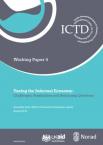ICTD Working Paper 9
The contribution of mining to economic and social development in Sub-Saharan Africa is under increased scrutiny and criticism. Minerals are non-renewable resources, and production represents a transformation from a sub-soil to a financial asset. Unless the gains are efficiently captured, saved and invested by the ultimate owner of the resource, the country in question could experience a net reduction in its national wealth.
Preliminary empirical evidence indicates that effective benefit-sharing in mining has been notoriously difficult to achieve. In this paper, we present a simple method to benchmark the degree of revenue-sharing in some major mining countries. This is utilised to estimate the amount of mining revenue foregone due to ineffective mining revenue-sharing in our case countries of Tanzania and Zambia during the period1998-2011. Using company-level data from the recently published Extractive Industries Transparency Initiative (EITI) reports in the two countries, we find that profit-based corporate tax made a very modest contribution to mining revenue, despite 5-10 years of operations under the current owners and a global mineral super cycle since 2005/6 (TEITI 2011; TEITI 2012; ZEITI2011; ZEITI 2012). Gross value-based corporate taxes, together with employee-based taxes, dominate the tax revenue collected from the mining sector.
The principal elements needed to secure improved revenue-sharing in mining are: i) robust fiscal design, including a progressive element to capture windfalls while encouraging cost-saving and production; ii) specialised tax administration for extractive industries and mining, to minimise the erosion of the tax base and to establish and enforce correct tax assessments; and iii) political will and accountability, together with government consistency, in order to secure the expected tax collection from mineral extraction over time with increased transparency of mining-related revenues.
